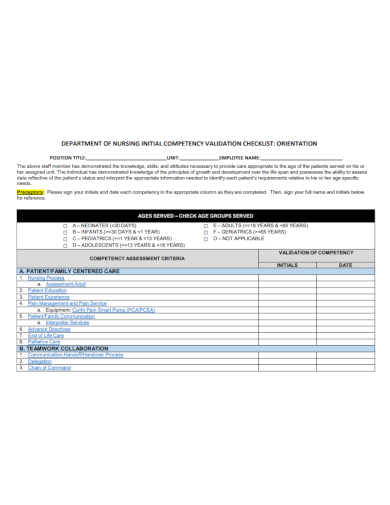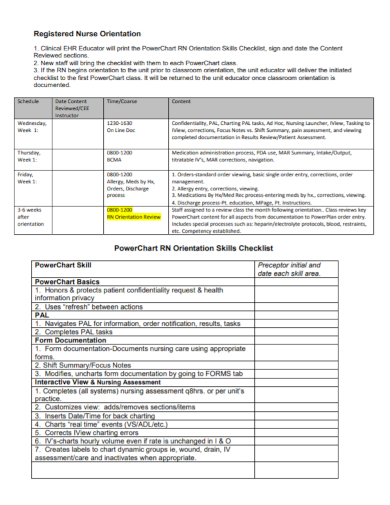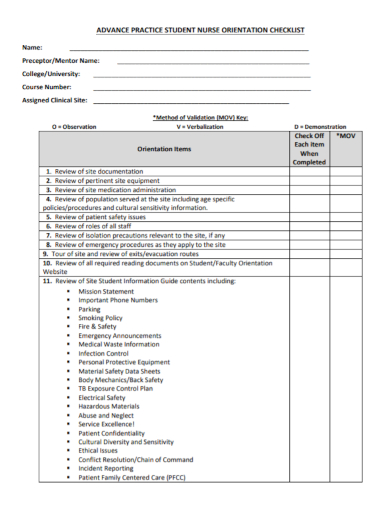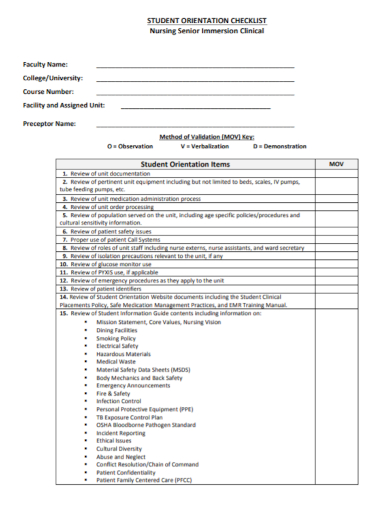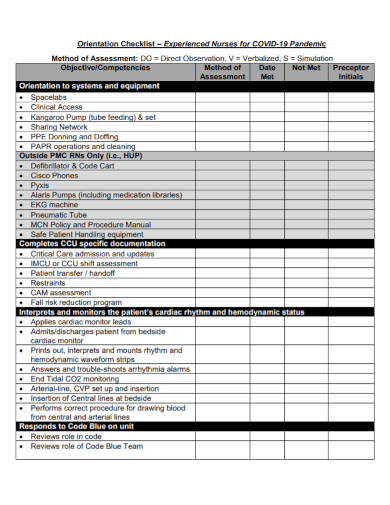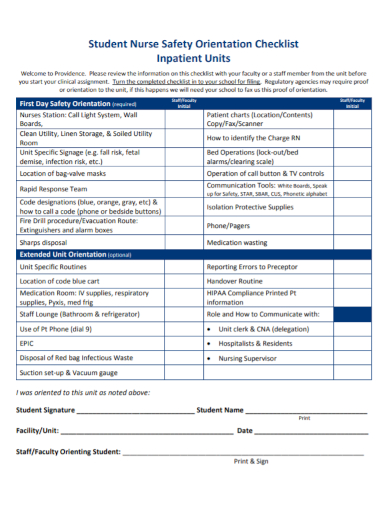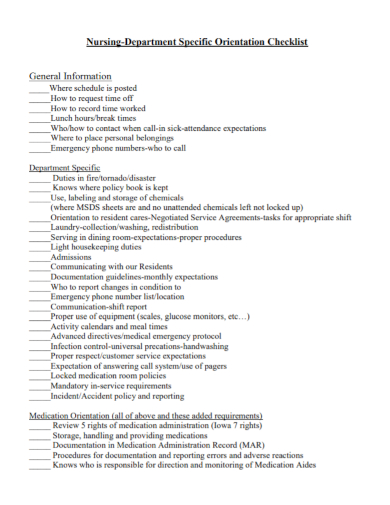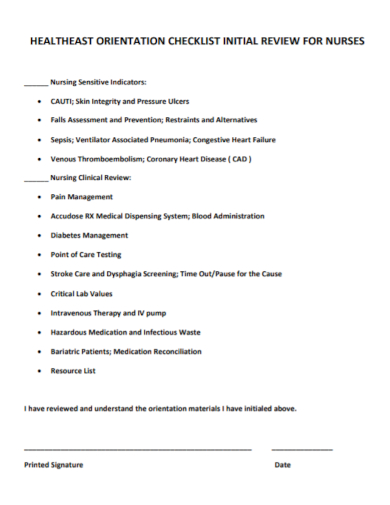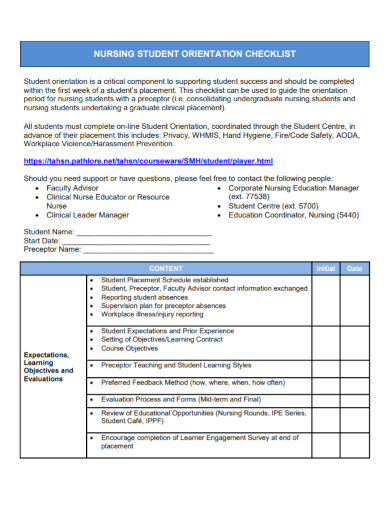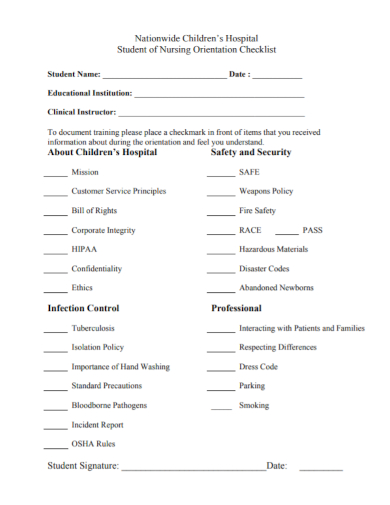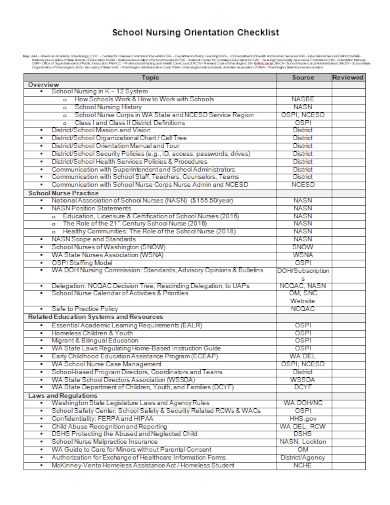10+ Nursing Orientation Checklist Samples
Nursing orientation is critical for newly hired registered nurses’ proficiency and retention. Nurses who complete effective orientation and precepting programs are enculturated as productive members of the healthcare team and provide competent, high-quality patient care. In light of the recent Covid-19 pandemic, it’s a major responsibility for the health-care sector to produce to produce nurses that are both qualified and more than capable for the job. In this article, we provide you with free and ready-to-use samples of Nursing Orientation Checklists for your convenience. Keep on reading to find out more!
1. Nursing Competency Orientation Checklist
2. Nursing Skills Orientation Checklist
3. Nursing Practice Orientation Checklist
4. Nursing Student Orientation Checklist
5. Experienced Nursing Orientation Checklist
6. Nursing Safety Orientation Checklist
7. Nursing Department Orientation Checklist
8. Nursing Health Orientation Checklist
9. Student Nursing Orientation Checklist
10. Hospital Nursing Orientation Checklist
11. School Nursing Orientation Checklist
What Is a Nursing Orientation Checklist?
The majority of hospital-based nursing orientation programs comprise a basic classroom orientation followed by an orientation on the unit where you were hired. Each department of the hospital will be represented in the classroom, as well as instruction on how to use the electronic medical record. As a result, a nursing orientation checklist is a tool for evaluating new nurses for their competence and skills.
How to Make a Nursing Orientation Checklist
Aside from the variety of free templates of Nursing Orientation Checklists provided above, you can also try to make one of your own from scratch. If you’re interested in making a checklist that is personalized to your own liking, here are some basic phases of a nursing orientation that you should remember:
1. Preparation
Nursing orientation success necessitates the creation of a curriculum as well as the training and preparedness of preceptors. Specialty units should think about including a didactic component in their orientation that covers common diagnoses and procedures, as well as high risk/low incidence competencies. In order to prepare instructors to orient newly hired registered nurses, a mentor training with modules on adult learning and offering feedback can be highly beneficial.
2. Inclusion
As soon as feasible, new employees should be welcomed and integrated into the team. Morning huddles, staff meetings, and e-mail communication are all good ways to introduce new staff members. Give a detailed tour of the area, introducing team members by name and job. Ensure that all electronic systems, including computer log-ins, parking garage and door access, and prescription dispensing system access, are available to incoming staff nurses as soon as possible. It’s annoying and demoralizing not to have access to the department’s systems, and it poses a barrier to learning.
3. Weekly Benchmark
Evaluation forms with suggested actions for each week are a good method to keep track of progress and help patients choose the right treatment. Instructors are encouraged to discuss the learning goals and objectives of new staff members with the charge nurse and staff nurses on a daily basis so that patient care and procedural opportunities can be identified. Onboarding new employees as a team sends a powerful message.
4. Two-way feedback.
Feedback that is timely and helpful will improve the learning experience and boost the confidence of the new nurse. It’s worth noting that there will be new team nurses who will require further training but will eventually succeed. As you analyze the completion of weekly goals, plan ahead for this.
FAQ
How long does a new nurse need to be orientated?
The majority of new nurses are undergoing training. Depending on your area of employment, this phase usually lasts 1-2 months. During this time, you will be paired with another nurse and will work alongside her.
What is the purpose of the orientation phase?
Orientation refers to the steps required to familiarize a new employee with the workplace, its duties, and expectations, as well as to train newly qualified nurses to be confident and deliver safe patient care. An orientation program’s principal purpose is to supply as many competent nurses as feasible.
At a nursing school orientation, what should I expect?
You will most likely begin classroom lectures on your first day if you attended an orientation. It’s entirely reasonable to be nervous. Starting a new school, such as nursing school, can be thrilling, but it can also be nerve-wracking. It’s natural to feel apprehensive, but try to keep things in perspective.
Overall, nursing orientation offers new nurses with concise and precise information to assist them feel more at ease in the hospital, inspire confidence, and help them adjust to the job more quickly. Download our customizable and printable Nursing School Checklist to help you out.
Related Posts
FREE 10+ Shift Report Templates
FREE 10+ Graduate Statement of Purpose Samples
FREE 8+ Nursing Note Templates
FREE 7+ Baby Shower Checklist Templates
FREE 7+ Sample Physical Exam
FREE 7+ Sample Student Self Assessment
FREE 7+ Nursing Report Samples
FREE 6+ Sample Interview Assessment Forms
FREE 11+ Baby Shower Checklist Templates
FREE 10+ Sample Orientation Evaluation Forms
FREE 10+ Performance Review Samples
FREE 10+ Mental Status Examination Report Samples
FREE 9+ Newborn Checklist Templates
FREE 7+ Sample CNA Job Duties
FREE 6+ Sample Competency Assessment

